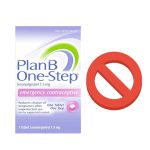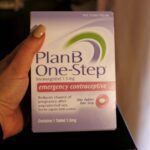10 Signs That Plan B Didn’t Work

Studies have shown that although most unintended pregnancies occur because couples do not use contraception, contraceptive failure is also a major underlying cause, particularly where contraceptive prevalence is high and where the contraceptive method mix skews toward methods with higher failure rates.
The global rate of unintended pregnancy is estimated at 44% of all pregnancies, corresponding to approximately 62 unintended pregnancies per 1000 women between the ages of 15–44 years old.
What is Plan B?
Plan B is an emergency contraceptive pill for women, it contains 1.5 mg of levonorgestrel—an ingredient that is also commonly found in birth control pills. Plan B can prevent pregnancy when people have sex without contraception. Plan B does not end an already established pregnancy and does not protect against sexually transmitted infections (STIs).
How does Plan B work?
If taken within 72 hours of unprotected sex or following a contraceptive accident, Plan B works by:
- Stopping ovulation temporarily
- Preventing fertilization
- Preventing implantation
Unlike regular birth control methods, which are used before or during sex, Plan B is used to prevent pregnancy after unprotected sex or following a contraceptive accident.
If taken within 3 days (72 hours) of unprotected sex, Plan B can reduce the chance of pregnancy by 75 to 89 percent. According to Plan B’s manufacturer, the sooner you take the pill, the more effective it is.
Research has found that Plan B is “moderately effective” when taken between 72 and 120 hours after sex. But remember that its effectiveness decreases the longer you wait.
How to use Plan B morning-after pills?
To use Plan B effectively, it’s essential to follow the instructions provided with the specific product you have purchased. However, here is a general overview of how to use Plan B:
1. Timing: Plan B is most effective when taken as soon as possible after unprotected sex or contraceptive failure. It is designed to prevent pregnancy if taken within 72 hours (three days) after intercourse, but it is most effective within the first 24 hours.
2. Obtain Plan B: Purchase Plan B from a pharmacy or a store where it is available over the counter. In many places, Plan B is available without a prescription or age restriction, but it’s important to check local regulations.
3. Read the instructions: Carefully read and understand the instructions provided in the package of the specific Plan B product you have purchased. Each product might have slight variations in dosage or administration, so it’s crucial to follow the instructions provided.
4. Take the pill: Plan B typically comes in a single-pill format. Swallow the pill with water. Some products may require you to take both pills at the same time or to take one pill immediately and the second pill after a specific time interval. Make sure to follow the instructions exactly.
5. Additional doses: In most cases, a single dose of Plan B is sufficient. However, if you vomit within two hours of taking the pill or if instructed by the product’s guidelines, you might need to take an additional dose.
6. Follow-up: After taking Plan B, it’s important to follow up with your regular healthcare provider. Plan B does not provide ongoing contraceptive protection, so discussing long-term contraceptive options with a healthcare professional is recommended.
7. Side effects: Plan B may cause side effects in some individuals, such as nausea, dizziness, fatigue, or changes in menstrual bleeding. These side effects are typically temporary and should subside within a few days. If you experience severe or persistent symptoms, it is advisable to consult a healthcare professional.
Can Plan B pill fail?
Yes, while Plan B is generally effective, there are certain circumstances in which it may fail. Here are ten reasons why Plan B might fail:
1. Timing: Plan B is most effective when taken as soon as possible after unprotected sex. Delaying the administration of the pill reduces its effectiveness and increases the chances of pregnancy.
2. Age and weight: Plan B’s effectiveness may vary based on a person’s weight and age. There is evidence suggesting that Plan B may be less effective in individuals who weigh more or are over a certain weight threshold.
3. Ovulation: If a person has already ovulated at the time of unprotected sex, Plan B may not prevent pregnancy. The pill primarily works by delaying or inhibiting ovulation, so if the egg has already been released, it may still be fertilized.
4. Multiple instances of unprotected sex: Plan B is designed to be taken as a one-time emergency contraceptive. If a person has engaged in multiple instances of unprotected sex, the efficacy of Plan B may decrease, and alternative contraception methods should be considered.
5. Medications or medical conditions: Certain medications and medical conditions can interfere with the effectiveness of Plan B. It is important to consult a healthcare professional or read the medication guidelines to determine if there are any potential interactions.
6. Ectopic pregnancy: While rare, there is a small possibility that Plan B may not prevent an ectopic pregnancy. An ectopic pregnancy occurs when a fertilized egg implants itself outside of the uterus, typically in the fallopian tube. Plan B cannot treat or prevent ectopic pregnancies.
7. Allergic reaction or vomiting: Some individuals may experience an allergic reaction to Plan B, which can reduce its effectiveness. Additionally, vomiting within a few hours of taking the pill may prevent proper absorption and decrease its efficacy.
8. Improper storage or expiration: Plan B should be stored correctly and within its expiration date to ensure its effectiveness. Using an expired pill or one that has not been stored properly may decrease its efficacy.
9. Failure to follow instructions: It is crucial to follow the instructions provided with Plan B accurately. Failing to take the pill as directed or missing any step may decrease its effectiveness.
10. Contraceptive method failure: Plan B is intended to be used as an emergency contraceptive in case of contraceptive failure. If a person’s primary contraceptive method fails, such as a condom breaking, the effectiveness of Plan B may be reduced.
It is important to note that while Plan B has a high success rate in preventing pregnancy, it is not 100% effective.
What are the signs that Plan B didn’t work?
Getting information on how to know if plan b worked before your period can prevent anxiety as no contraceptive including Plan B is 100% reliable. Birth control pills like Plan B are 99 percent effective with “perfect use but can also fail to work properly.
Plan B is designed to maintain a constant level of hormones in your body temporarily. If you did not take it at the right time, your hormone levels can drop quickly. Depending on where you are in your cycle, this may cause you to ovulate. Ovulation can increase your chances of becoming pregnant.
Reckless alcohol consumption can also cause Plan B failure. While under the influence, some women may forget to take the pill at the correct time. If you vomit too soon after taking Plan B, your body may not be able to absorb any of the hormones. This can result in a drop in your hormone levels, which could trigger ovulation and result in Plan B failure.
Many people go online looking for signs that Plan B didn’t work on Reddit, while others go in search of Plan B symptoms 2 weeks later.
The internet is replete with many Plan B didn’t work stories as well as pregnant after Plan B stories. However, pregnant after morning-after pill symptoms are the best signs that Plan B might have failed to work as expected.
The following are some of the signs that Plan B didn’t work:
Light Headedness
If Plan B didn’t work, you might feel dizzy or light-headed at times indicating that you might be pregnant. After you get pregnant, your blood vessels dilate to prepare for the increased blood flow, which lowers blood pressure and creates that feeling of lightheadedness.
Fatigue
Another sign that Plan B did not work correctly is fatigue which is one of the most common early signs of pregnancy. Activities that never phased you before may tire you out, and you might want to sleep a lot even if you have gotten 7-9 hours already. The body is producing more blood to support the developing baby, which can cause fatigue and increase your need for nutrients. These symptoms usually last through the first trimester and can be alleviated by resting, eating a nutrient-rich diet, and drinking plenty of fluids.
Breast Changes
If Plan B did not work as it should, you may notice your breasts may become heavy, swollen, or tender. Some women experience this symptom before their period, so it can be confused with PMS. However, one thing that happens during the early weeks of pregnancy that does not occur during a regular menstrual cycle might tip you off. If your areolas – the circles of pigmented skin surrounding the nipples – may darken or even become enlarged.
Spotting
Some women experience spotting as an early sign of pregnancy. Small amounts of light pink or brownish blood may appear a week or so before your period is due which implies that your Plan B pill did not work as it should. This type of spotting is called implantation bleeding. As the fertilized egg attaches to the uterine lining, it can cause irritation and light bleeding. Sometimes this is mistaken as a period, but spotting is usually much lighter than a regular period.
Cramping
Another sign that Plan B didn’t work that can be confused with PMS or a regular period is cramping. During pregnancy, blood flow increases all over the body. Increased blood flow in the uterus can cause cramping. These cramps are usually mild, but if they become severe enough to affect your daily routine, you should see your doctor. Many women experience similar cramping right before their regular menstrual period, but it’s a common early symptom of pregnancy. So, if you have cramps (or the spotting mentioned above), don’t give up hope that you’re pregnant just yet.
Changes in Food Preference
If you suddenly discover that your food preference has changed, it is likely that Plan B did not work and you are pregnant. Strange food cravings are a staple cliche in TV and films about pregnant women. However, that stereotype is rooted in reality. Many pregnant women develop cravings or aversions to food a few weeks after conception. You might find yourself wanting to eat things you don’t usually eat. Your favorite foods might suddenly make you nauseous. Or you may lose your appetite altogether.
Sensitivity to Smells
For some women, contraceptive failure and the resulting pregnancy makes their sense of smell go into overdrive. Exaggerated reactions to certain smells can tie into morning sickness and food preference. Scents that are not very strong to other people can be pungent and unpleasant to a pregnant woman.
Frequent Urination
If Plan B didn’t work, it implies that fertilization has taken place. After conception, your kidneys start working harder to filter the increased blood flow, resulting in the urge to urinate more frequently. This symptom can start right before your missed period.
Morning Sickness
Morning sickness is notoriously incorrectly named. As most pregnant women can tell you, it can happen at any time. It is also a common early sign of pregnancy before you miss your period. A few weeks after conception, your body produces more estrogen and progesterone, causing nausea or vomiting. According to the American College of Obstetricians and Gynecologists (ACOG), morning sickness subsides after the first trimester for some women, while others have it throughout the entire pregnancy.
Can Plan B cause birth defects if taken during early pregnancy?
While some research has suggested a link between the use of birth control pills near conception and an increased risk of low birth weight, preterm birth, or congenital urinary tract abnormalities, these concerns generally haven’t been observed in clinical experience.
As a precaution, if you suspect you’re pregnant, take a home pregnancy test. If the home pregnancy test is positive, stop taking the pill. If taking a home pregnancy test isn’t possible, stop taking the Plan B until the pregnancy is confirmed or ruled out. In the meantime, use another method of birth control — such as condoms.
If you’re concerned because you took Plan B before you knew you were pregnant, talk to your health care provider, but be assured that there’s little risk.
What Drugs can affect the effectiveness of Plan B?
Certain medications can alter the effectiveness of Plan B.
If you take any of the following, speak with a healthcare professional before buying Plan B:
• rifampin (an antibiotic)
• griseofulvin (an antifungal)
• St. John’s wort (an herb)
• seizure medications, including carbamazepine, phenobarbital, and primidone
• some HIV medications, including efavirenz
Although the manufacturers advise taking Plan B within 3 days of unprotected sex, you can take it up to 5 days after penis-in-vagina sex.





